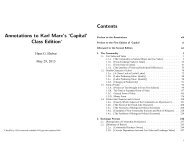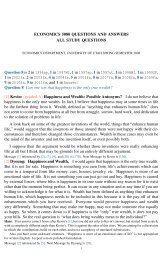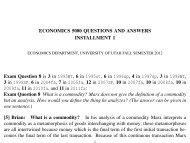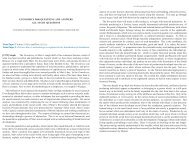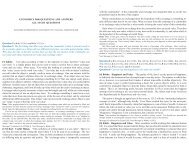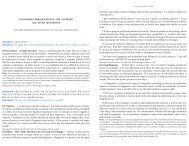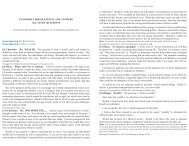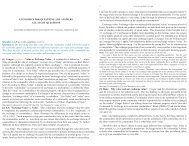Question 1 What did Marx mean with his formu - University of Utah
Question 1 What did Marx mean with his formu - University of Utah
Question 1 What did Marx mean with his formu - University of Utah
Create successful ePaper yourself
Turn your PDF publications into a flip-book with our unique Google optimized e-Paper software.
U <strong>of</strong> <strong>Utah</strong> Econ 5080 2005fa 67<br />
<strong>Question</strong> 100 Coat and linen are qualitatively different use-values. Are they exchanged<br />
because their use-values are different, or because the labors in them are different?<br />
[112] Iblindone: content B– form 95% The coat and linen can be exchanged for many<br />
different reasons – it is up to the individuals exchanging the goods. Due to social division<br />
<strong>of</strong> labor, individuals specialize in different types <strong>of</strong> labor and therefore an individual that<br />
specializes in producing linen uses less labor-time than another individual that specializes<br />
in producing coats and vice versa. By these two trading they are not only trading the usevalues,<br />
they are trading because the labor is different in them (labor-time). By trading they<br />
both can have more commodities (use-values) for less labor.<br />
Hans: Your answer to the question seems to be: the underlying reason <strong>of</strong> their trading is not the difference in the<br />
use-values themselves, also not the differences in labor, but the savings in labor-time.<br />
Message [112] referenced by [113], [2007SP:84], [2007SP:436], and [2007SP:509]. Next Message by Iblindone is<br />
[538].<br />
[113] Hans: How voluntary is our market participation? Iblindone’s answer [112]<br />
gives a good overview <strong>of</strong> the mainstream economics approach to the exchange process via<br />
absolute advantage. Individuals can decide whether to trade or not, and they trade only if it<br />
is to their advantage. <strong>Marx</strong>’s approach is different. In <strong>his</strong> theory, it is not up to the individual<br />
whether they exchange or not. Individuals cannot produce alone. They need society because<br />
they need produced use-values. Society has an elaborate market system ready for them,<br />
which the individuals must engage in if they do not want to starve.<br />
The emphasis <strong>of</strong> <strong>Marx</strong>’s analysis is the structure <strong>of</strong> t<strong>his</strong> market, i.e., how prices are determined<br />
and which things are on the market (not only goods but also wage-labor and interestbearing<br />
assets). T<strong>his</strong> structure is not determined by individual preferences but by the underlying<br />
organization <strong>of</strong> social production. A <strong>Marx</strong>ist would say: as long as the individuals do<br />
not really have a choice, individual preferences cannot explain much. The individuals are<br />
embedded in a web <strong>of</strong> social relations which they have not created. You cannot start <strong>with</strong><br />
the individual to understand these social relations, but you have to understand the logic <strong>of</strong><br />
these relations in their own right. (For capitalist social relations, a good starting point is not<br />
the individual but the commodity.)<br />
Next Message by Hans is [116].<br />
[114] Thugtorious: (graded A) Chicken and Egg. The question, in my opinion, still<br />
remains a little unanswered. It is a sort <strong>of</strong> “chicken and the egg” paradox: is it the differing<br />
useful labors or the use-values <strong>of</strong> the commodities themselves that allows for exchange? I<br />
think that the question itself needs a little clarification: the commodities themselves are exchanged<br />
amongst people because <strong>of</strong> their different use-values, i.e. you would not exchange<br />
commodity A <strong>with</strong> a person for commodity B if you <strong>did</strong> not see a potential use-value <strong>with</strong>in<br />
commodity B. However, below t<strong>his</strong> market transaction, you will find that the commodities<br />
are able to be exchanged in t<strong>his</strong> manner also because <strong>of</strong> their use-value. The useful labor<br />
congealed in the commodities must be different in order for them to be able to be exchanged.<br />
However, if the use-values <strong>of</strong> the final product are the same, then the labor expended <strong>with</strong>in<br />
production must also be the same. If two commodities have the same use-values then they<br />
cannot be exchanged as commodities in the market. And, the congealed labor <strong>with</strong>in the<br />
commodities is the same. The inverse <strong>of</strong> t<strong>his</strong> is also true: if the commodities have different<br />
use-values, then they can be exchanged, and the labor congealed in them must be different.<br />
68 2005fa Econ 5080 U <strong>of</strong> <strong>Utah</strong><br />
So, in answering the question, it is the use-value <strong>of</strong> the commodities being different that<br />
allows them to be exchanged and also provides the reason <strong>of</strong> why they are exchanged.<br />
The differing qualities <strong>of</strong> labor used <strong>with</strong>in the production <strong>of</strong> each commodity are an<br />
element <strong>with</strong>in the exchange-value <strong>of</strong> the two commodities. The use value is the reason for<br />
which they are exchanged, while the exchange-value is the way in which that is possible.<br />
Hans: It is true that the use-values are different whenver the labors are different and vice versa. But despite their<br />
simultaneous occurrence they still can have different causal effects. I say in [116] what the effects <strong>of</strong> different<br />
labors might be.<br />
Next Message by Thugtorious is [117].<br />
[116] Hans: Pulling the strings in the background. If the use-values were equal, people<br />
on the market would not see reason to exchange. But if the labors were equal, then there<br />
might perhaps be no division <strong>of</strong> labor at all, rather everybody might produce everything for<br />
themselves.<br />
T<strong>his</strong> intention <strong>of</strong> question 100 is to encourage you to think more about the effects which<br />
the organization <strong>of</strong> production has for our daily lives. At the beginning <strong>of</strong> Das Kapital, <strong>Marx</strong><br />
makes exactly t<strong>his</strong> kind <strong>of</strong> inference: he asks what the activity <strong>of</strong> the commodity owners on<br />
the market tells us about the underlying relations <strong>of</strong> production.<br />
Many things which we may take for granted in our daily lives have their unacknowledged<br />
reasons in the sphere <strong>of</strong> production. For instance, one <strong>of</strong>ten hears that schools are so bad<br />
because there is not enough money for them. Why isn’t there more money available for<br />
schools? The deeper reason is that the exploitative capitalist relations do not need welleducated<br />
wage-workers. If the cannon-fodder on the assembly lines is educated, t<strong>his</strong> makes<br />
things more difficult for the capitalists. All they need to learn is how to show up on time and<br />
follow boring orders. Besides, it is useful for your employer if you are convinced that you<br />
are dumb and do not deserve better. T<strong>his</strong> is exactly what our school system teaches.<br />
Message [116] referenced by [114], [134], and [2010fa:1209]. Next Message by Hans is [121].<br />
[134] DarkKnight: graded A The coat and the linen are exchanged because their usevalues<br />
are different, <strong>with</strong> the exception that one might wrap five yards <strong>of</strong> linen about oneself<br />
to keep warm instead <strong>of</strong> exchanging it for a coat. Typically, however, they would be used for<br />
different purposes. Though the labors used to produce each commodity might be qualitatively<br />
different (the production processes are different), at a basic level, the abstract human<br />
labor is the same. A laborer’s time and effort were used in the production process, regardless<br />
<strong>of</strong> the commodity produced. Per <strong>Marx</strong>, the equality <strong>of</strong> the labor is expressed by the<br />
exchange. The value <strong>of</strong> the labor <strong>of</strong> five yards <strong>of</strong> linen and the coat are equal because that is<br />
what we find when they are exchanged on the market.<br />
Hans: Your conclusion can be framed in the paradoxical <strong>formu</strong>lation: commodities are exchanged because the<br />
labors in them are different (otherwise everyone would just produce their own, see [116]), and because the labors<br />
are equal (t<strong>his</strong> provides the commonality on which the exchange is based). But we are no longer afraid <strong>of</strong> contradictions,<br />
are we?<br />
Next Message by DarkKnight is [398].<br />
<strong>Question</strong> 106 is 79 in 1999SP, 94 in 2003fa, 105 in 2004fa, 119 in 2007SP, 120 in 2007fa,<br />
and 130 in 2010fa:



